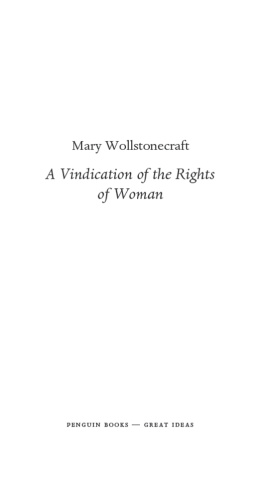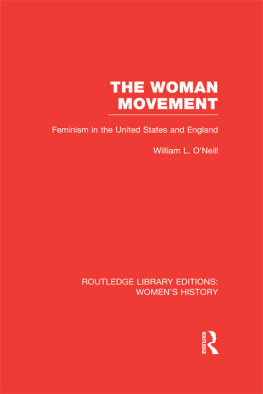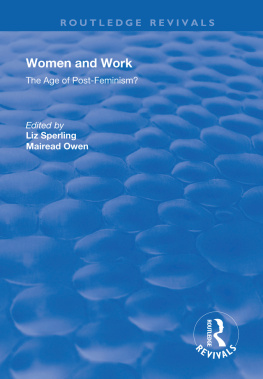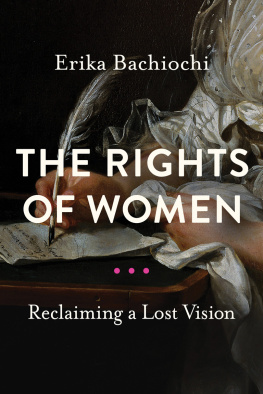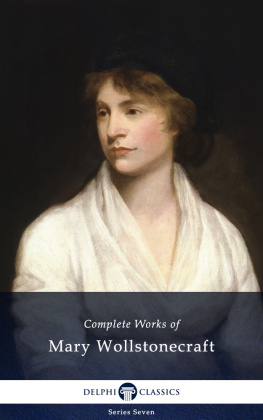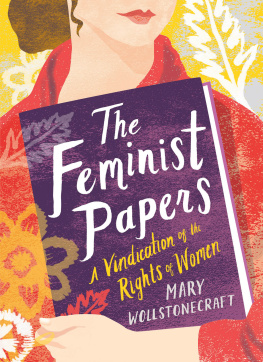PENGUIN BOOKS GREAT IDEAS
A Vindication of the Rights of Woman
Mary Wollstonecraft
17591797
Mary Wollstonecraft
A Vindication of the Rights of Woman
PENGUIN BOOKS GREAT IDEAS
PENGUIN BOOKS
Published by the Penguin Group
Penguin Group (USA) Inc., 375 Hudson Street, New York, New York 10014, U.S.A.
Penguin Group (Canada), 90 Eglinton Avenue East, Suite 700, Toronto, Ontario, Canada M4P 2Y3 (a division of Pearson Penguin Canada Inc.)
Penguin Books Ltd, 80 Strand, London WC2R 0RL, England
Penguin Ireland, 25 St Stephens Green, Dublin 2, Ireland
(a division of Penguin Books Ltd)
Penguin Group (Australia), 250 Camberwell Road, Camberwell, Victoria 3124, Australia (a division of Pearson Australia Group Pty Ltd)
Penguin Books India Pvt Ltd, 11 Community Centre, Panchsheel Park, New Delhi110 017, India
Penguin Group (NZ), 67 Apollo Drive, Mairangi Bay, Auckland 1311, New Zealand (a division of Pearson New Zealand Ltd)
Penguin Books (South Africa) (Pty) Ltd, 24 Sturdee Avenue, Rosebank, Johannesburg 2196, South Africa
Penguin Books Ltd, Registered Offices:
80 Strand, London WC2R 0RL, England
This edition published in Penguin Books (UK) 2004
Published in Penguin Books (USA) 2006
5 7 9 10 8 6 4
Reprinted from A Vindication of the Rights of Woman,
edited and introduced by Miriam Brody
(Penguin Classics, 1975).
ISBN: 978-1-101-65082-0
Library of Congress Cataloging-in-Publication Data
Wollstonecraft, Mary, 1759-1797.
A vindication of the rights of woman / Mary Wollstonecraft.
p. cm. (Great ideas)
Taken from the Penguin Classics edition of A vindication of the rights of woman, edited by Miriam BrodyT.p. verso.
1. WomenSocial and moral questionsEarly works to 1800.
2. Womens rightsEarly works to 1800. I. Title. II. Series.
HQ1596.W4796 2006
305.420941dc22 2006043791
Printed in the United States of America
Set in Monotype Dante
Except in the United States of America, this book is sold subject to the condition that it shall not, by way of trade or otherwise, be lent, resold, hired out, or otherwise circulated without the publishers prior consent in any form of binding or cover other than that in which it is published and without a similar condition including this condition being imposed on the subsequent purchaser.
The scanning, uploading and distribution of this book via the Internet or via any other means without the permission of the publisher is illegal and punishable by law. Please purchase only authorized electronic editions, and do not participate in or encourage electronic piracy of copyrighted materials. Your support of the authors rights is appreciated.
Authors Introduction
After considering the historic page, and viewing the living world with anxious solicitude, the most melancholy emotions of sorrowful indignation have depressed my spirits, and I have sighed when obliged to confess that either Nature has made a great difference between man and man, or that the civilization which has hitherto taken place in the world has been very partial. I have turned over various books written on the subject of education, and patiently observed the conduct of parents and the management of schools; but what has been the result? a profound conviction that the neglected education of my fellow-creatures is the grand source of the misery I deplore, and that women, in particular, are rendered weak and wretched by a variety of concurring causes, originating from one hasty conclusion. The conduct and manners of women, in fact, evidently prove that their minds are not in a healthy state; for, like the flowers which are planted in too rich a soil, strength and usefulness are sacrificed to beauty; and the flaunting leaves, after having pleased a fastidious eye, fade, disregarded on the stalk, long before the season when they ought to have arrived at maturity. One cause of this barren blooming I attribute to a false system of education, gathered from the books written on this subject by men who, considering females rather as women than human creatures, have been more anxious to make them alluring mistresses than affectionate wives and rational mothers; and the understanding of the sex has been so bubbled by this specious homage, that the civilized women of the present century, with a few exceptions, are only anxious to inspire love, when they ought to cherish a nobler ambition, and by their abilities and virtues exact respect.
In a treatise, therefore, on female rights and manners, the works which have been particularly written for their improvement must not be overlooked, especially when it is asserted, in direct terms, that the minds of women are enfeebled by false refinement; that the books of instruction, written by men of genius, have had the same tendency as more frivolous productions; and that, in the true style of Mahometanism, they are treated as a kind of subordinate beings, and not as a part of the human species, when improvable reason is allowed to be the dignified distinction which raises men above the brute creation, and puts a natural sceptre in a feeble hand.
Yet, because I am a woman, I would not lead my readers to suppose that I mean violently to agitate the contested question respecting the quality or inferiority of the sex; but as the subject lies in my way, and I cannot pass it over without subjecting the main tendency of my reasoning to misconstruction, I shall stop a moment to deliver, in a few words, my opinion. In the government of the physical world it is observable that the female in point of strength is, in general, inferior to the male. This is the law of Nature; and it does not appear to be suspended or abrogated in favour of woman. A degree of physical superiority cannot, therefore, be denied, and it is a noble prerogative! But not content with this natural pre-eminence, men endeavour to sink us still lower, merely to render us alluring objects for a moment; and women, intoxicated by the adoration which men, under the influence of their senses, pay them, do not seek to obtain a durable interest in their hearts, or to become the friends of the fellow-creatures who find amusement in their society.
I am aware of an obvious inference. From every quarter have I heard exclamations against masculine women, but where are they to be found? If by this appellation men mean to inveigh against their ardour in hunting, shooting, and gaming, I shall most cordially join in the cry; but if it be against the imitation of manly virtues, or, more properly speaking, the attainment of those talents and virtues, the exercise of which ennobles the human character, and which raises females in the scale of animal being, when they are comprehensively termed mankind, all those who view them with a philosophic eye must, I should think, wish with me, that they may every day grow more and more masculine.
This discussion naturally divides the subject. I shall first consider women in the grand light of human creatures, who, in common with men, are placed on this earth to unfold their faculties; and afterwards I shall more particularly point out their peculiar designation.
I wish also to steer clear of an error which many respectable writers have fallen into; for the instruction which has hitherto been addressed to women, has rather been applicable to ladies, if the little indirect advice that is scattered through Sandford and Merton be excepted; but, addressing my sex in a firmer tone, I pay particular attention to those in the middle class, because they appear to be in the most natural state. Perhaps the seeds of false refinement, immorality, and vanity, have ever been shed by the great. Weak, artificial beings, raised above the common wants and affections of their race, in a premature unnatural manner, undermine the very foundation of virtue, and spread corruption through the whole mass of society! As a class of mankind they have the strongest claim to pity; the education of the rich tends to render them vain and helpless, and the unfolding mind is not strengthened by the practice of those duties which dignify the human character. They only live to amuse themselves, and by the same law which in Nature invariably produces certain effects, they soon only afford barren amusement.

